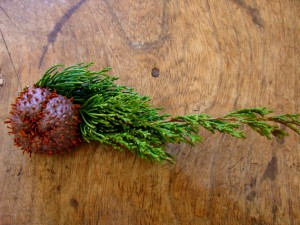
“Holy Cow! What is this crazy thing growing on my trees?” Great question! It’s not an alien space nut, but it definitely looks like one. The strange looking growths that appear on Cedar trees this time of year are caused by a fungus called Cedar apple rust. In order to complete its life cycle, the fungus causes swellings, or galls, on Cedar trees.
Most gardeners won’t notice the hard brown galls when they first appear in summer. They are still small, and often disguised by the lush needles at the tips of the branches. But they are difficult to overlook as they swell in spring, and later produce gelatinous orange tentacles during warm, wet weather.
The tentacles release spores into the air that infect apple trees. They germinate within a few minutes on the moist leaves. The infection does not travel within the tree, but causes orange spots to develop on the leaves. These lesions then produce more spores, that infect Cedars, and the cycle continues.
The disease does cause serious damage to the leaves of apple trees, and can completely defoliate even healthy trees. Trees that are repeatedly infected with cedar apple rust can decline, and fruit volume and quality often suffers.
Unfortunately, there is little the Nantucket gardener can do to prevent Cedar apple rust. Experts recommend planting apple trees five miles away from Cedars so that the life cycle cannot be completed. But we have Cedars growing on nearly every part of the island, so that’s just not possible. If you have Cedars, you can expect to see at least a few of these galls each year.
Because the branch tips beyond the gall will eventually die, there is no reason not to remove galls as you see them. Overall, Cedars are left unharmed by the gall, and will continue to thrive. The only way to stop the spores from infecting apple trees is with fungicides. The application of these products must be precisely timed to be effective. Nantucketers serious about producing high quality apples, should consider contacting a professional tree expert to take care of the applications.
